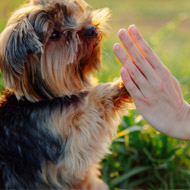
Scientists review evidence on the cognitive abilities of dogs
Dogs are not exceptionally intelligent when compared with other animals, according to new research.
The study, published in Learning and Behaviour, reviewed more than 300 pieces of evidence that compared the cognitive abilities of domestic dogs with three distinct animal groups (other domestic animals, social hunters and carnivores).
Researchers found that the brain power of dogs was matched by at least several species in each group, and that there were several cases of “over-interpretation” in favour of dogs’ abilities.
The study was carried out by the Universities of Exeter and Canterbury Christ Church.
“During our work it seemed to us that many studies in dog cognition research set out to ‘prove’ how clever dogs are,” explained Professor Stephen Lea from the University of Exeter.
“They are often compared to chimpanzees and whenever dogs ‘win’, this gets added to their reputation as something exceptional. Yet in each and every case we found other valid comparison species that do at least as well as dogs do in those tasks.”
The researchers focussed on physical cognition, sensory cognition, social cognition, spatial cognition and self-awareness.
"Taking all three groups into account, dog cognition does not look exceptional,” said Dr Britta Osthaus from Canterbury Christ Church University.
“We are doing dogs no favour by expecting too much of them. Dogs are dogs, and we need to take their needs and true abilities into account when considering how we treat them.”



 The Veterinary Medicines Directorate (VMD) is inviting applications from veterinary students to attend a one-week extramural studies (EMS) placement in July 2026.
The Veterinary Medicines Directorate (VMD) is inviting applications from veterinary students to attend a one-week extramural studies (EMS) placement in July 2026.